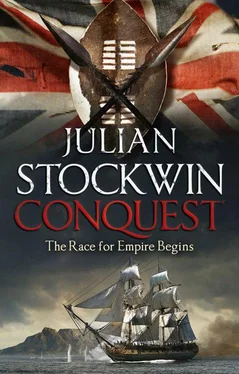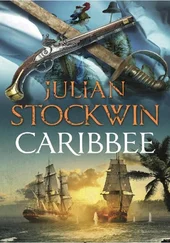Julian Stockwin - Conquest
Здесь есть возможность читать онлайн «Julian Stockwin - Conquest» весь текст электронной книги совершенно бесплатно (целиком полную версию без сокращений). В некоторых случаях можно слушать аудио, скачать через торрент в формате fb2 и присутствует краткое содержание. Жанр: Старинная литература, на английском языке. Описание произведения, (предисловие) а так же отзывы посетителей доступны на портале библиотеки ЛибКат.
- Название:Conquest
- Автор:
- Жанр:
- Год:неизвестен
- ISBN:нет данных
- Рейтинг книги:5 / 5. Голосов: 1
-
Избранное:Добавить в избранное
- Отзывы:
-
Ваша оценка:
- 100
- 1
- 2
- 3
- 4
- 5
Conquest: краткое содержание, описание и аннотация
Предлагаем к чтению аннотацию, описание, краткое содержание или предисловие (зависит от того, что написал сам автор книги «Conquest»). Если вы не нашли необходимую информацию о книге — напишите в комментариях, мы постараемся отыскать её.
Conquest — читать онлайн бесплатно полную книгу (весь текст) целиком
Ниже представлен текст книги, разбитый по страницам. Система сохранения места последней прочитанной страницы, позволяет с удобством читать онлайн бесплатно книгу «Conquest», без необходимости каждый раз заново искать на чём Вы остановились. Поставьте закладку, и сможете в любой момент перейти на страницу, на которой закончили чтение.
Интервал:
Закладка:
‘Are the English to be a brutal conqueror, exacting tribute, imposing our language, alien forms of law, taxation? Are they to be dispossessed by arbitrary laws of their ancient lands, losing their ancestral homes, their investments against old age?
‘Everything is set on its head and they will listen to any who promises to restore the old ways. Sir – I have a proposition. Should we do as the Romans did, then we will be at considerable advantage.’
‘Pray continue . . . Mr Secretary.’
‘We keep the structure of native rule in place, complete with laws and customs, without interference, merely ensuring the ruler is complaisant. Do you declare by proclamation that this be so, that none may fear loss or seizure, that we English do hold ourselves under the same laws and that—’
‘A radical conceit, sir!’
‘– providing always that such is not in conflict with any English common law. Sir, the Dutch system is derived from the Roman tradition, as ours is. I’ll wager there are paltry differences only, and the customs are harmless. For a little given, much is gained.’
‘I’ll reserve opinion on the Romans as an exemplar, but your proposition is interesting. Damn, it, very interesting . . . It means they’ll have little to complain of, they ruling themselves, and if they wax fat on the trade we put their way, most will frown on any who seek to trouble it.’
Renzi said nothing, giving space for Baird to explore the thought.
‘Hmm. Laws ’n’ customs – I suppose this includes their currency? Then here we have a solution to our lack of specie. Let ’em keep using their old money, whatever that is. Pay our soldiers in suchlike, and the market can’t refuse our coin, it being theirs . . . Yes, it’ll raise eyebrows among my colonels but we have possibilities.’
His forehead creased in concentration. ‘Ha! Another fine thought – we treat with their old town council or whatever with a view to adopting it in its glorious entirety, lord mayor and all! This way we’ll have no need to face the tedium of forming our own with all its devising of pettifogging ordinances and drain to the Treasury. Yes, by Jove!’
He reflected for a moment, then slapped his hand down. ‘We’ll do it! Nothing to say I, as governor, can’t make it so! Um, first thing is to get it down in a form o’ words. Then we trot it by the former Dutch nabob in charge, who’ll see it in his interest to be restored to power, and we’ll then get it cast into the local lingo.’
‘Do we have any familiar with the law, sir?’
‘Umm – no. And it has to be safely in the legal cant.’ Baird was downcast for only a moment, then brightened. ‘No – but the Dutch have. This nabob making common cause with us you can be certain will leave nothing to chance in this way. Splendid! I’ll trouble you to draw up our draft form o’ words while I send out for the chap and we’ll have something to show for a good afternoon’s work.’
Kydd was only too aware that for sailors a death at sea, when not in the presence of the enemy, must always be attended with the proper forms of respect – a muster at the ship’s side, prayers and then a flag-draped body consigned to the deep.
For the three who did not return there could not be all of this. But regular service at sea saw many a fall from the yard at night, a rogue sea sweeping the fore-deck and other hazards taking life and leaving nothing, and there were long-hallowed traditions of the captain gathering the men, ensuring the right words were said. As was the way of the Service, L’Aurore put to sea immediately afterwards, duty bound.
They sailed away from the sunset, the seamen at their mess-decks muted over their evening grog. Later there would be the traditional ceremony about the foremast as the dead sailors’ kit and treasured possessions were auctioned to their messmates, the proceeds always many times the actual value of the items, to go eventually to their loved ones – but it would be many months or even years before they would hear of their loss.
Kydd missed Renzi. Through the years they had contrived to stay together and now he was no longer there, so Kydd would dine alone. Most captains did, of course, unless invited by the gunroom, or at breakfast with the offgoing officer-of-the-watch and a brace of tongue-tied midshipmen, but Kydd had grown used to Renzi’s company.
Would Renzi soon tire of acting the scribe for a precarious land-bound bureaucracy? Like himself, Kydd knew his friend relished the broad horizons and freedoms of the sea, and perhaps the fetters of unchanging routine would become irksome.
The long but slight southerly swell gave a pleasing rhythm to L’Aurore ’s easy leg seaward; in the morning she would close with the land to resume her easterly course, the next fortress marked as Onrusberge. And in the meantime he would try to let sleep soften the images of the day.
A rose-tinted dawn saw the frigate raise the long rocky spit at Hangklip; their position secure, a couple of tacks into the south-south-easterly, and they were approaching an immense stretch of bright sand-hills as far as the eye could see, at its northern end a small settlement below rumpled umber heights that stretched away inland.
‘To quarters, if you please,’ Kydd ordered. Their chart was a dozen years old, and the modest battery on the hill above might well have been strengthened since then to give them an unpleasant surprise.
Located well into the hook at the end of the bay, Onrusberge was on a dead lee shore and L’Aurore prudently came to well clear, conveniently out of range of any guns. Taking the officer-of-the-watch’s telescope while his barge was being prepared, Kydd carefully inspected the land. Set many miles to the south-east and separated by formidable country, there was the prospect that the news of Cape Town’s surrender had not reached it, if the terse notations on the chart were to be believed.
Their appearance had created something of a stir, for there was noticeable activity ashore. He swept the heights, searching for the fort. There was none evident, only a low jumble of square grey structures. Could this mean that it was in some way concealed?
Under sail, his barge made for the distant cluster of houses, surfing before the swell with bellying sails, a large white flag high and prominent. He had a minimal boat’s crew and was unarmed, and noted warily a gathering of figures along the shore.
Kydd directed the boat towards its centre. A small file of soldiers appeared and began to form up. When they were closer, he could see that they were at the head of a projecting flat tongue of rock, which had a rickety jetty perched along it.
The swell urged them inshore with dismaying rapidity. Kydd glanced at Poulden at the tiller; unusually, his calm features were set in a frown. It was a delicate judgement in seamanship: wind abaft, the swell translating to white-capped seas driven ever higher as they surged in, and the small jetty with barely a boat’s length to come up to. In this craft it would be lunacy to make a direct approach, the seas only too ready to smash against its pretty but squared-off transom before Kydd could make it to dry land.
He said nothing, letting Poulden make his decision. A hundred yards off, both sails came down at the run and oars thumped into their thole pins. For a moment there was an awkward slewing as the boat lost way before they could find their rhythm, but then Poulden saw his chance and brought the boat round, head to seas.
It was masterly: now the barge was keeping position against the onrushing combers, edging across until it was within oar’s length of the jetty.
‘Sorry, sir,’ Poulden said, trying to work out what was happening ashore.
Any but a lubberly crew would see the need for a rope thrown to bring them in the last few yards but the reception party just stood like statues. ‘I’ll go for’ard,’ Kydd said, finding his way down to the bows, and when Poulden brought them in at an angle, he would be ready for that split-second moment when bow touched jetty.
Читать дальшеИнтервал:
Закладка:
Похожие книги на «Conquest»
Представляем Вашему вниманию похожие книги на «Conquest» списком для выбора. Мы отобрали схожую по названию и смыслу литературу в надежде предоставить читателям больше вариантов отыскать новые, интересные, ещё непрочитанные произведения.
Обсуждение, отзывы о книге «Conquest» и просто собственные мнения читателей. Оставьте ваши комментарии, напишите, что Вы думаете о произведении, его смысле или главных героях. Укажите что конкретно понравилось, а что нет, и почему Вы так считаете.









